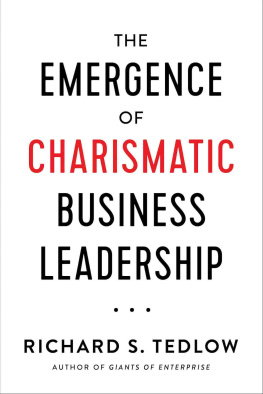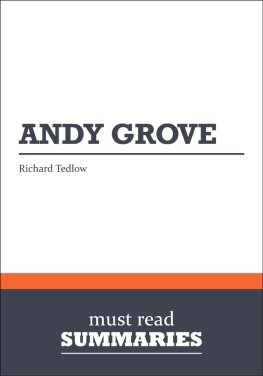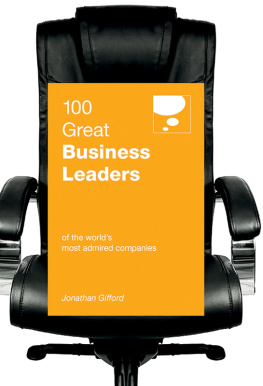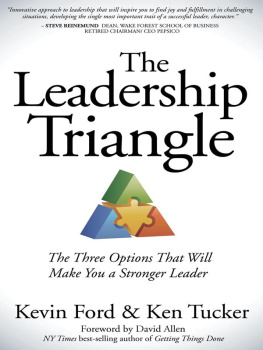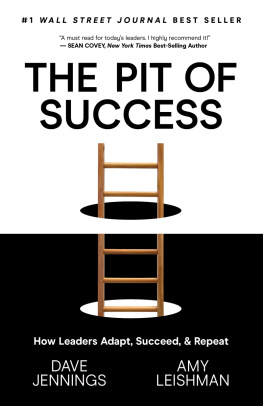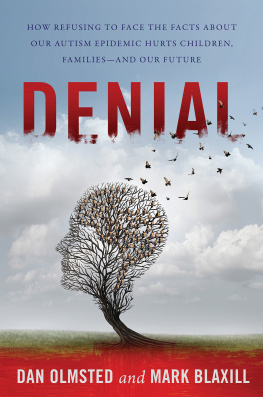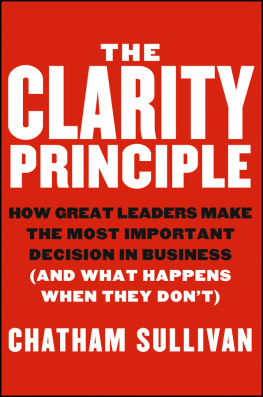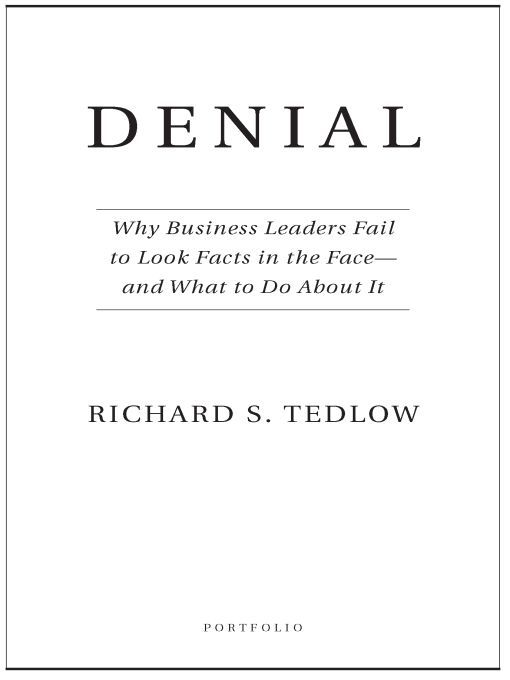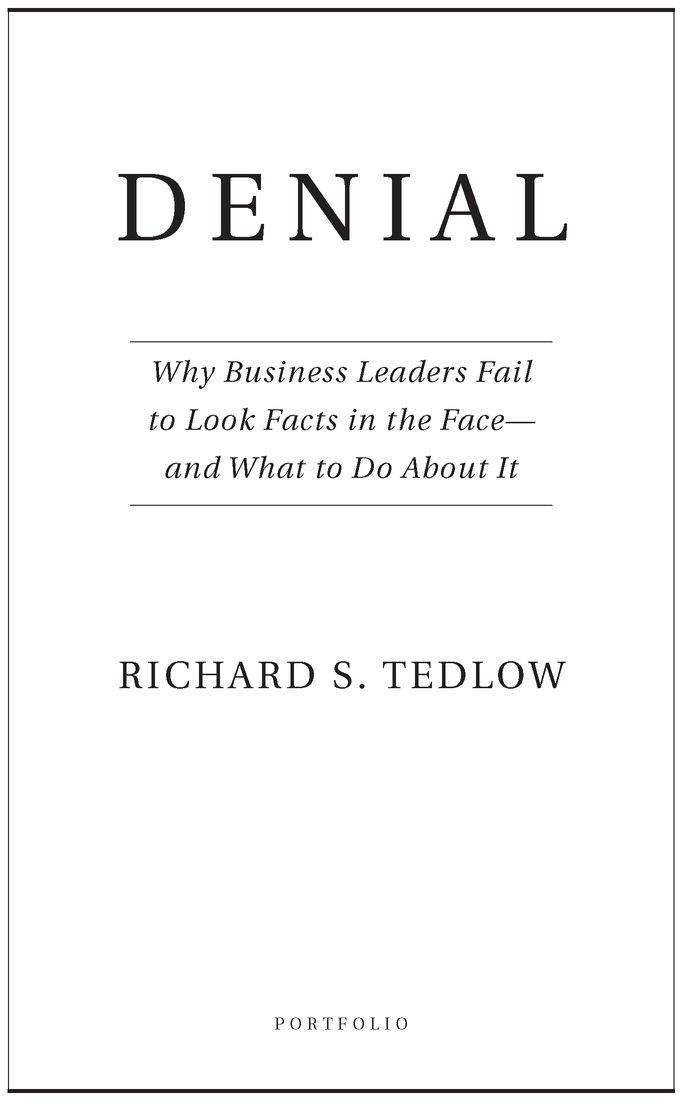Table of Contents
This book is dedicated to the future:
ANNA, CARLA, EMILY, GIOVANNI, JULIE,
MARY, NATALIE, WILLIAM
Nothing is easier than self-deception. For what each man wishes, that he also wishes to be true.
Demosthenes (384-322 B.C.)
There is something in the nature of CEOspride, vanity, a primal need for control, an obsession with success, good old-fashioned idealismthat makes many smart, well-regarded chief executives into idiots when the world turns against them.
CEOs in Denial, Fortune, June 21, 1999
Introduction
This book is being written in the midst of the worst global economic crisis since the Great Depression. How, when, and indeed if the crisis will end no one knows. But whatever the future holds and the postmortems reveal about the crisis, one culprit is abundantly clear: denial.
Denial by financiers who pursued short-term gain while ignoring long-term consequences that were highly likely, if not inevitable.
Denial by the banking and real-estate industries that what goes up can come down.
Denial by homeowners and consumers that the bills for goods bought on credit will someday come due.
Denial by investors who convinced themselves, once again, that this time, its different.
Denial by politicians and bureaucrats of inconvenient truths that didnt fit their free-market ideology.
Denial even by swindlers whose Ponzi schemes could only end in disaster, not just for their victims but for themselves.
Denial today is all around us. Eliot Spitzer, the governor of New York (who made his name while the states attorney general as the watchdog of Wall Street), was in March 2008 caught patronizing a high-priced prostitute in a fancy Washington hotel. It quickly came out that this was not his first such dalliance. Later, after he had resigned as governor because of the scandal, Spitzer was asked by a television interviewer how a well-known politician such as himself could possibly have expected to get away with such behavior. [Being caught] crossed my mind, he replied, but like many things in life, you ignore the obvious at a certain moment because you simply dont want to confront it.
If youre looking for a succinct expression of the essence of denial, it would be hard to do better than this. You ignore the obvious. Why? Because you simply dont want to confront it. You know the consequences, but you dont know. You see, but you dont see.
Denial is the unconscious calculus that if an unpleasant reality were true, it would be too terrible, so therefore it cannot be true. It is what Sigmund Freud described as the combination of knowing with not knowing. It is, in George Orwells blunt formulation, protective stupidity.
From the young child who insists that his parents havent separated even though his father has moved out, to the alcoholic who swears he is just a social drinker, to the president who declares mission accomplished when it isnt, denial permeates every facet of life. Business is no exception. In fact, denial may be the biggest and potentially most ruinous problem that businesses face, from start-ups to mature, powerful corporations.
But surely businesspeople ought to be among the most hardheaded and clear-eyed among us. Why would a sane, smart person deny a fact of critical importance to his or her business? Because, to state the obvious, he or she is human. And the impulse to avoid painful truths, just like the impulse to avoid pain itself, is a part of human nature.
I have been teaching and writing about business history for four decades, and what is striking about the dozens of companies and CEOs I have studied is the large number of them who have made mistakes that could and should have been avoided, not just with the benefit of hindsight, but on the basis of information available to decision makers right then and there, in real time. These mistakes resulted from individuals denying reality.
Denial is a pervasive problem not only historically but today. It seduces not only dreamers but the most rational people among us. Why is it seductive? Because it is soothing. It is convenient. It allows us to live in a world of our own creationwhile it lasts. It permits us an as if existence. We live as if things were the way we want them to be, rather than the way they are.
But this is only part of the seduction. Denial sometimes actually works. Plenty of entrepreneurs have succeeded even though others denied they had a chance. The overwhelming majority of new businesses fail. Everyone who starts a business denies that the statistics apply in his or her case.
Even denial in the face of certain catastrophe is not necessarily irrational. The inevitability of catastrophe does not mean that we personally will suffer its consequences. Our successors or descendants may pay the price instead. Aprs moi, le dluge was the famous phrase attributed to Louis XV. After me, the deluge. He did not use the preposition pendant, which means during.
Anyone could increase the profits of Procter & Gamble this year by eliminating the advertising for Tide. It would be a terrible blow to the brand in the long term, but sales might not slump too badly right away. A decision like that would be so obvious that it would make news. However, the same result could be achieved in a thousand less public ways throughout the corporate world.
Even in the case of certain catastrophe, denial can be an intelligent strategy. Permit me to provide a personal illustration. As my late wife was dying of cancer, she once said to me that we should declare a forthcoming holiday a disease-free weekend. I immediately agreed. Denial was automatic and complete. We lived as if she were healthy. She bought us four wonderful days in the face of the abyss.
Denial is seductive because it can work in the short term. Occasionally it works in the long term, but that is rarely true in business. In business, pretending that things are better than they are virtually ensures failure.
As we have noted, however, denial is a part of human nature. You can never avoid it completely, and its avoidance is not a matter of raw intelligence. The protagonists in the first part of this book were not stupid. If they could succumb to denial, anyone can.
Yet as the second part of the book shows, some people rise above denial and stare reality unblinkingly in the face. These exemplars of courage and clarity are remarkable and merit scrutiny. Indeed, the British sociologist Stanley Cohen suggests that denial is so common that rather than trying to fathom why we deny, we should instead focus on when and why we do not. When do people pay attention? he asks. When do they recognize the significance of what they know? When will they be aroused to act, even at personal risk?
Shedding light on these questions is the aim of this book. Discovering who got it right, who got it wrong, and why may help us to answer them and move us closer to our goal. A goal that should be no more or less than this: to confront more than we deny.
Part I
GETTING IT WRONG
Shooting the Messenger: Henry Ford and the Model T
October 1, 2008, was a noteworthy date in the history of the automobile industry. It was the centennial of the sale of the first Model T Ford. The Model T, anointed the car of the century in 1999 by a vote of international automotive journalists, revolutionized transportation in the United States. It made the Ford Motor Company the signature firm in the world for a quarter of a century, and it made Henry Ford Americas second billionaire after John D. Rockefeller.


